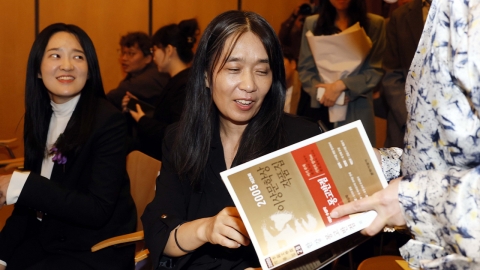Chinese scholar "It's not a coincidence to win the Han River Nobel Prize"...a magical power in a work
이미지 확대 보기

Photo Source: Yonhap News
In China, after Han Kang's Nobel Prize in Literature, interest in his work continues, and a Chinese scholar has contributed an article to the local media that details the world of Han Kang's work.
Han Mei, a professor at Beijing University of Foreign Studies' Asian Academy, wrote in a review in the Chinese weekly Caixin on the 20th, "When Han Kang became the first Asian female writer to receive a Nobel Prize, many people said it was unexpected, and it seems to show that the Nobel Prize for Literature is under change," adding, "But if you look closely, Han Kang's win is by no means a complete coincidence."
Professor Han explained, "Although he is only 54 years old this year, he is definitely a younger generation than the average age of 65 for Nobel Prize winners, Han Kang's literary creation period has already been 30 years and his achievements are comparable."
He then introduced in detail the contents and implications of the masterpieces such as "The Vegetarian" and "The Boy Is Coming," including the birth, family environment, and the career of Han Kang.
Professor Han summarized Han Kang's masterpiece "The Vegetarian" as "a question about complex human fighting" and evaluated, "With the meticulousness and sensitivity unique to female writers, it reveals the difficulties and wounds Koreans have faced at home and in society, and their unhappiness and pain."
"Han Kang's description of the contradiction between women and the world is particularly deep because he is a woman and it is easier to sympathize with women's positions, but based on this, it is difficult to conclude that Han Kang's novels belong to women's literature," he said. "The man he paints also suffers from frustration at work and at home and passes near collapse, and objectively, Han Kang has already exceeded the attention of gender and gender."
Professor Han explained that Han Kang, who researched a number of historical records of the May 18 Gwangju Democratization Movement before writing The Boy Comes, wrote a story about the noble man through this novel.
"[The boy is coming] broke the tradition of looking at this case from a political point of view and tried to interpret the nature of the case starting with humanity with more universality," he said. "We focused on the memories and persistent pain that this case left for everyone."
Professor Han said, "Han Kang's novels do not seem very attractive because the plot is relatively simple, the structure is relatively loose, and the tone is rather gloomy," adding, "However, they have a mysterious power that prevents the reader from letting go and can leave a deep impression even after covering the book."
"The literature of the Han River has been constantly changing and the 'young' Han River is still growing," he said. "I believe that more Asian writers will enter the view of European and American readers, meaning that Korean literature and even Asian literature are attracting attention from the European and American literature."
※ 'Your report becomes news'
[Kakao Talk] YTN Search and Add Channel
[Phone] 02-398-8585
[Mail] social@ytn.co.kr
Professor Han explained, "Although he is only 54 years old this year, he is definitely a younger generation than the average age of 65 for Nobel Prize winners, Han Kang's literary creation period has already been 30 years and his achievements are comparable."
He then introduced in detail the contents and implications of the masterpieces such as "The Vegetarian" and "The Boy Is Coming," including the birth, family environment, and the career of Han Kang.
Professor Han summarized Han Kang's masterpiece "The Vegetarian" as "a question about complex human fighting" and evaluated, "With the meticulousness and sensitivity unique to female writers, it reveals the difficulties and wounds Koreans have faced at home and in society, and their unhappiness and pain."
"Han Kang's description of the contradiction between women and the world is particularly deep because he is a woman and it is easier to sympathize with women's positions, but based on this, it is difficult to conclude that Han Kang's novels belong to women's literature," he said. "The man he paints also suffers from frustration at work and at home and passes near collapse, and objectively, Han Kang has already exceeded the attention of gender and gender."
Professor Han explained that Han Kang, who researched a number of historical records of the May 18 Gwangju Democratization Movement before writing The Boy Comes, wrote a story about the noble man through this novel.
"[The boy is coming] broke the tradition of looking at this case from a political point of view and tried to interpret the nature of the case starting with humanity with more universality," he said. "We focused on the memories and persistent pain that this case left for everyone."
Professor Han said, "Han Kang's novels do not seem very attractive because the plot is relatively simple, the structure is relatively loose, and the tone is rather gloomy," adding, "However, they have a mysterious power that prevents the reader from letting go and can leave a deep impression even after covering the book."
"The literature of the Han River has been constantly changing and the 'young' Han River is still growing," he said. "I believe that more Asian writers will enter the view of European and American readers, meaning that Korean literature and even Asian literature are attracting attention from the European and American literature."
[Kakao Talk] YTN Search and Add Channel
[Phone] 02-398-8585
[Mail] social@ytn.co.kr
[Copyright holder (c) YTN Unauthorized reproduction, redistribution and use of AI data prohibited]
Editor's Recomended News
AD
The Lastest News
-
재생
 Today, the National Audit of the Supreme Prosecutors' Office... 'Deutsche, President Impeachment' is expected to be a slugfest.
Today, the National Audit of the Supreme Prosecutors' Office... 'Deutsche, President Impeachment' is expected to be a slugfest. -
재생
 "President must have made up his mind"...Revealing the results of the interview is "unclear."
"President must have made up his mind"...Revealing the results of the interview is "unclear." -
Lim Young-woong's concert movie ranks first in the number of live audiences of all time.
-
재생
 Even strong winds in the contrast...Flooding all over the waterfront roads
Even strong winds in the contrast...Flooding all over the waterfront roads




![[Y Ranking] Fashion Best Nana vs. The worst, Park Kyu-young.](https://image.ytn.co.kr/general/jpg/2024/1020/202410200800013922_h.jpg)
![[Yetterview] 'Grand Prize Actor' Kim Dong-wook Comedy Again After 5 Years...What did your wife say?](https://image.ytn.co.kr/general/jpg/2024/1019/202410190900018278_h.jpg)




